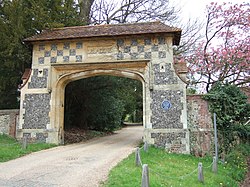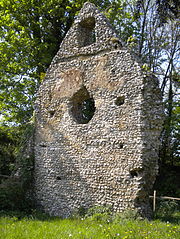Westhumble
| Westhumble | |
| Surrey | |
|---|---|
 Arch leading to Camilla Drive | |
| Location | |
| Grid reference: | TQ165518 |
| Location: | 51°15’13"N, 0°19’51"W |
| Data | |
| Population: | 649 (2011) |
| Post town: | Dorking |
| Postcode: | RH5 |
| Dialling code: | 01306 |
| Local Government | |
| Council: | Mole Valley |
| Parliamentary constituency: |
Mole Valley |
Westhumble is a village in the midst of rural Surrey, about a mile north of Dorking, and most;y in the ecclesiastical parish of Mickleham.
The area is served by Box Hill & Westhumble railway station (which is the southern terminus of the 'Thames Down Link' from Kingston upon Thames).
Immediately to the north is Norbury Park, managed by Surrey Wildlife Trust, and there are several National Trust properties nearby, including Box Hill and Polesden Lacey.
The Mole Gap Trail runs through the village, crossing the North Downs Way less than quarter of a mile to the south. The railway station.

History
The earliest archaeological evidence for human activity in the village is a large axe, typical of a "rough-out" axe produced during the Neolithic Age, which was discovered in 1952 during building work in Burney Road.[1] The discovery of a Flint Mine at East Horsley and flakes of flint found at Fetcham and Headley Heath of the same period, suggest that this part of the North Downs had been settled by the late Stone Age, around 10 000 to 3000 BC.[2]
The earliest recorded mention of Westhumble is in the Assizes Rolls of 1248, in which it appears as Wystumble. The name is thought to derive from the Old English wice meaning a wych elm, and the Middle English stumbel meaning tree stump.[3] The village is not explicitly mentioned in Domesday Book, its acres belonging to the Parish of Mickleham, and the second of the Mickleham records may refer to Westhumble.[4] The mediæval village was centred on the present-day midpoint of Adlers Lane with gently sloping fields to the north and south. The identity of the manor house is unclear, however there are repeated references to Hadlers Hall and later Audlers Hole in the Court Roll records. It has been suggested that the hall was the original manor house. There is no trace of the house today.[5]

The oldest building is the ruined chapel at the extreme west end of the village: the Westhumble Chapel, of which only the west gable and parts of the east end remain. The chapel may have belonged to the manor of Polesden.[6] The chapel is thought to have been built during the late twelfth or early thirteenth century for the use of villagers, particularly when floods prevented them from reaching the parish church in Mickleham. The chapel was probably abandoned as a place of worship during the mid-sixteenth century, although part of it was used as a farm outbuilding for some time. Repairs to the remaining walls were carried out during 1938 and the site is now owned by the National Trust.[6]
Much of the early history of the village is uncertain, because the manorial records were deliberately destroyed by fire in 1776.[7] During the late Middle Ages and Early Modern periods, it would appear that the focal point of the village shifted half a mile eastwards from Adlers Lane to Westhumble Street.[6] The shift in position may have reflected the growing importance of the north-south road through the Mole Gap and the relative decrease in importance of the east-west route along the North Downs. Although the turnpike through the valley was not completed until 1755, the route was regularly being used to transport goods including charcoal and poultry to Kingston and London by the 14th century.[8] For much of the winter the ford across the River Mole would have been impassable and so a secondary route on higher ground along the western side of the valley was used, of which Westhumble Street formed the southernmost part.
The name Westhumble Street is first recorded in 1736 (some 19 years before the construction of the turnpike) suggesting that the village took advantage of the passing trade on the road along the Downs. The movement of the village centre was confirmed with the construction of the new manor house, Camilla Lacey, north of Chapel Lane in 1816.[5]
Much of the modern village dates from the two decades following the break-up and sale of the Camilla Lacey estate in 1932 following the death of the owner Victor Freeman. By the outbreak of Second World War, most of the houses in Pilgrims Way had been built although those in Burney Road, Adlers Lane and Pilgrims Close were not constructed until the late 1940s.[5]
Outside links
| ("Wikimedia Commons" has material about Westhumble) |
- West Humble Lane, Dorking (1806) by Cornelius Varley - The Tate
- Spring in Westhumble, Surrey by Michael Anthony Harvey (1921–2000) - Dorking Museum & Heritage Centre
- Gate to Camilla Lacey, Mrs Ball's Cottage and Barn Mission Room by CFG - Dorking Museum & Heritage Centre
References
- ↑ Rankine WF (1952). "Neolithic Axe from Westhumble". Surrey Archaeological Collections (Surrey Archaeological Society) 52: 80.
- ↑ Wood ES (1952). "Neolithic Sites in West Surrey". Surrey Archaeological Collections (Surrey Archaeological Society) 52: 11–28.
- ↑ Gover, J. E. B.; Mawer, A.; Stenton, F.M.; with Bonner, A.: 'Place-Names of Surrey , Part' (English Place-Names Society, 1934)
- ↑ A History of the County of Surrey - Volume pp 300-308: @ (Victoria County History)
- ↑ 5.0 5.1 5.2 Shepperd, Ronald (1982). The Manor of Wistomble in the Parish of Mickleham. Westhumble Association. ASIN B000X8PZMC.
- ↑ 6.0 6.1 6.2 Braun H (1941). "A Report on the Exploration Conducted by the Box Hill Committee of the National Trust in the Winter of 1937–1938". Surrey Archaeological Collections (Surrey Archaeological Society) 47: 6–11.
- ↑ Shepperd, Ronald (1991). Micklam the story of a parish. Mickleham Publications. ISBN 0-9518305-0-3.
- ↑ A History of the County of Surrey - Volume 3 pp 142–144: @ (Victoria County History)
Shepperd, Ronald (1982). The Manor of Wistomble in the Parish of Mickleham. Westhumble Association. ASIN B000X8PZMC.
Shepperd, Ronald (1991). Micklam the story of a parish. Mickleham Publications. ISBN 0-9518305-0-3.
